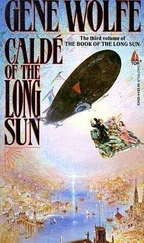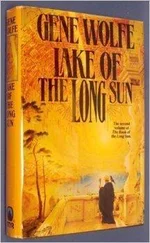Wolfe, Gene - The Best of Gene Wolfe
Здесь есть возможность читать онлайн «Wolfe, Gene - The Best of Gene Wolfe» весь текст электронной книги совершенно бесплатно (целиком полную версию без сокращений). В некоторых случаях можно слушать аудио, скачать через торрент в формате fb2 и присутствует краткое содержание. Жанр: Старинная литература, на английском языке. Описание произведения, (предисловие) а так же отзывы посетителей доступны на портале библиотеки ЛибКат.
- Название:The Best of Gene Wolfe
- Автор:
- Жанр:
- Год:неизвестен
- ISBN:нет данных
- Рейтинг книги:5 / 5. Голосов: 1
-
Избранное:Добавить в избранное
- Отзывы:
-
Ваша оценка:
- 100
- 1
- 2
- 3
- 4
- 5
The Best of Gene Wolfe: краткое содержание, описание и аннотация
Предлагаем к чтению аннотацию, описание, краткое содержание или предисловие (зависит от того, что написал сам автор книги «The Best of Gene Wolfe»). Если вы не нашли необходимую информацию о книге — напишите в комментариях, мы постараемся отыскать её.
The Best of Gene Wolfe — читать онлайн бесплатно полную книгу (весь текст) целиком
Ниже представлен текст книги, разбитый по страницам. Система сохранения места последней прочитанной страницы, позволяет с удобством читать онлайн бесплатно книгу «The Best of Gene Wolfe», без необходимости каждый раз заново искать на чём Вы остановились. Поставьте закладку, и сможете в любой момент перейти на страницу, на которой закончили чтение.
Интервал:
Закладка:
“No, I have them here.” He pressed a switch. “Now remember, you must not stop talking.”
But for the first few moments I was much too interested to talk.
There had appeared in the room, as though by magic, a boy considerably younger than I, and a painted wooden soldier almost as large as I was myself, which when I reached out to touch them proved as insubstantial as air. “Say something,” my father said. “What are you thinking about, Number Five?”
I was thinking about the soldier, of course, and so was the younger boy, who appeared to be about three. He toddled through my arm like mist and attempted to knock it over.
They were holographs—three-dimensional images formed by the interference of two wave fronts of light—things which had seemed very dull when I had seen them illustrated by flat pictures of chessmen in my physics book; but it was some time before I connected those chessmen with the phantoms who walked in my father’s library at night. All this time my father was saying, “Talk! Say something! What do you think the little boy is feeling?”
“Well, the little boy likes the big soldier, but he wants to knock him down if he can, because the soldier’s only a toy, really, but it’s bigger than he is. . . . ” And so I talked, and for a long time, hours I suppose, continued. The scene changed and changed again. The giant soldier was replaced by a pony, a rabbit, a meal of soup and crackers. But the three-year-old boy remained the central figure. When the hunched man in the shabby coat came again, yawning, to take me back to my bed, my voice had worn to a husky whisper and my throat ached. In my dreams that night I saw the little boy scampering from one activity to another, his personality in some way confused with my own and my father’s so that I was at once observer, observed, and a third presence observing both.
The next night I fell asleep almost at the moment Mr. Million sent us up to bed, retaining consciousness only long enough to congratulate myself on doing so. I woke when the hunched man entered the room, but it was not me whom he roused from the sheets but David. Quietly, pretending I still slept (for it had occurred to me, and seemed quite reasonable at the time, that if he were to see I was awake he might take both of us), I watched as my brother dressed and struggled to impart some sort of order to his tangle of fair hair. When he returned I was sound asleep, and had no opportunity to question him until Mr. Million left us alone, as he sometimes did, to eat our breakfast. I had told David my own experiences as a matter of course, and what he had to tell me was simply that he had had an evening very similar to mine. He had seen holographic pictures, and apparently the same pictures: the wooden soldier, the pony. He had been forced to talk constantly, as Mr. Million had so often made us do in debates and verbal examinations. The only way in which David’s interview with our father had differed from mine, as nearly as I could determine, appeared when I asked him by what name he had been called.
He looked at me blankly, a piece of toast half-raised to his mouth.
I asked again, “What name did he call you by when he talked to you?”
“He called me David. What did you think?”
With the beginning of these interviews the pattern of my life changed, the adjustments I assumed to be temporary becoming imperceptibly permanent, settling into a new shape of which neither David nor I was consciously aware. Our games and stories after bedtime stopped, and David less and less often made his panpipes of the silver trumpet vine. Mr. Million allowed us to sleep later and we were in some subtle way acknowledged to be more adult. At about this time too, he began to take us to a park where there was an archery range and provision for various games. This little park, which was not far from our house, was bordered on one side by a canal. And there, while David shot arrows at a goose stuffed with straw or played tennis, I often sat staring at the quiet, only slightly dirty water, or waiting for one of the white ships—great ships with bows as sharp as the scalpel bills of kingfishers and four, five, or even seven masts—which were, infrequently, towed up from the harbor by ten or twelve spans of oxen.
I
n the summer of my eleventh or twelfth year—I think the twelfth—we were permitted for the first time to stay after sundown in the park, sitting on the grassy, sloped margin of the canal to watch a fireworks display. The first preliminary flight of rockets had no sooner exhausted itself half a mile above the city than David became ill. He rushed to the water and vomited, plunging his hands half up to the elbows in muck while the red and white stars burned in glory above him. Mr. Million took him up in his arms, and when poor David had emptied himself we hurried home.
His disease proved not much more lasting than the tainted sandwich that had occasioned it, but while our tutor was putting him to bed I decided not to be cheated of the remainder of the display, parts of which I had glimpsed between the intervening houses as we made our way home; I was forbidden the roof after dark, but I knew very well where the nearest stair was. The thrill I felt in penetrating that prohibited world of leaf and shadow while fireflowers of purple and gold and blazing scarlet overtopped it affected me like the aftermath of a fever, leaving me short of breath, shaking, and cold in the midst of summer.
There were a great many more people on the roof than I had anticipated, the men without cloaks, hats, or sticks (all of which they had left in my father’s checkrooms), and the girls, my father’s employees, in costumes that displayed their rouged breasts in enclosures of twisted wire like birdcages or gave them the appearance of great height (dissolved only when someone stood very close to them), or gowns whose skirts reflected their wearers’ faces and busts as still water does the trees standing near it, so that they appeared, in the intermittent colored flashes, like the queens of strange suits in a tarot deck.
I was seen, of course, since I was much too excited to conceal myself effectively, but no one ordered me back, and I suppose they assumed I had been permitted to come up to see the fireworks.
These continued for a long time. I remember one patron, a heavy, square-faced, stupid-looking man who seemed to be someone of importance, who was so eager to enjoy the company of his protégée—who did not want to go inside until the display was over—that, since he insisted on privacy, twenty or thirty bushes and small trees had to be rearranged on the parterre to make a little grove around them. I helped the waiters carry some of the smaller tubs and pots, and managed to duck into the structure as it was completed. Here I could still watch the exploding rockets and “aerial bombs” through the branches, and at the same time the patron and his nymphe du bois , who was watching them a good deal more intently than I.
My motive, as well as I can remember, was not prurience but simple curiosity. I was at that age when we are passionately interested, but the passion is one of science. Mine was nearly satisfied when I was grasped by the shirt by someone behind me and drawn out of the shrubbery.
When I was clear of the leaves I was released, and I turned expecting to see Mr. Million, but it was not he. My captor was a little gray-haired woman in a black dress whose skirt, as I noticed even at the time, fell straight from her waist to the ground. I suppose I bowed to her, since she was clearly no servant, but she returned no salutation at all, staring intently into my face in a way that made me think she could see as well in the intervals between the bursting glories as by their light. At last, in what must have been the finale of the display, a great rocket rose screaming on a river of flame, and for an instant she consented to look up. Then, when it had exploded in a mauve orchid of unbelievable size and brilliance, this formidable little woman grabbed me again and led me firmly toward the stairs.
Читать дальшеИнтервал:
Закладка:
Похожие книги на «The Best of Gene Wolfe»
Представляем Вашему вниманию похожие книги на «The Best of Gene Wolfe» списком для выбора. Мы отобрали схожую по названию и смыслу литературу в надежде предоставить читателям больше вариантов отыскать новые, интересные, ещё непрочитанные произведения.
Обсуждение, отзывы о книге «The Best of Gene Wolfe» и просто собственные мнения читателей. Оставьте ваши комментарии, напишите, что Вы думаете о произведении, его смысле или главных героях. Укажите что конкретно понравилось, а что нет, и почему Вы так считаете.









